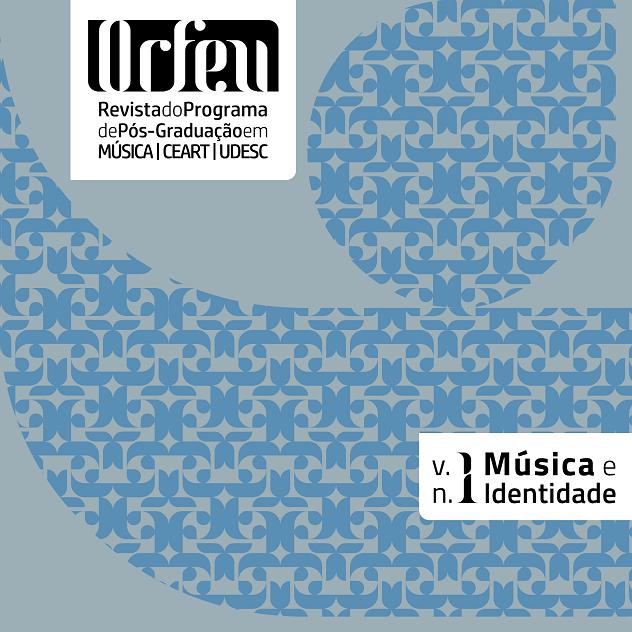As diversas sonoridades do grupo de rock brasileiro O Terço: discussões sobre as identidades musicais nos anos 1970
DOI:
https://doi.org/10.5965/2525530401012016109Palabras clave:
sonoridade, identidade, rock brasileiroResumen
O artigo apresenta uma proposta analítica das sonoridades construídas pelo grupo brasileiro de rock O Terço, durante a década de 1970. Mostra-se que o grupo em questão não trouxe uma ideia fixa de música, ou melhor, de rock brasileiro. Com diversas influências do gênero rock, e de várias sonoridades já consideradas como parte da música brasileira, os músicos d’O Terço trouxeram suas representações de campo e cidade, tradição e modernidade, elogio ao rock e críticas ao contexto da ditadura civil-militar no Brasil. Tais ideias serão analisadas em algumas canções selecionadas para este estudo. Para tal, propõe-se conjugar as ferramentas metodológicas dos autores Bruce Baugh (1994), Marcos Napolitano (2002), Felipe Trotta (2008) e Paul Friedlander (2012), demonstrando como os elementos musicais estabelecem um jogo dinâmico com seu tempo histórico. Discutem-se, também, algumas teorias e problemáticas sobre identidade, por meio dos estudos de Fredrik Barth (1998), Stuart Hall (1998) e Miguel Alberto Bartolomé (2006). Com estes, procura-se apontar que a identidade é sempre construída dentro de um contexto, sendo, portanto, relacional.Descargas
Citas
ALVES, Luciano (org.). O melhor de Flávio Venturini. SP: Irmãos Vitale. s/d.
BARTH, Fredrik. “Grupos étnicos e suas fronteiras”. POUTGNAT, Philippe; STREIFF-Fenart, Jocelyne. Teorias da etnicidade. SP: Editora da UNESP, 1998.
BARTOLOMÉ, Miguel Alberto. “As etnogêneses: velhos atores e novos papéis no cenário cultural e político”. Mana. 12(1), 2006, p.39-68.
BAUGH, Bruce. “Prolegômenos a uma estética do rock”. Novos Estudos. São Paulo, CEBRAP, n. 38, p.15-23, 1994.
BRUBAKER, Roger. “Au-delá de l’identité”. In: Actes de la Recherche em sciences sociales. 2001. vol. 139, n.1, p.66-85.
CHARTIER, Roger. À beira da falésia: a história entre incertezas e inquietudes. Porto Alegre: Ed. Universidade/UFRGS, 2002.
FRIEDLANDER, Paul. Rock and roll: uma história social. 7. Ed. RJ: Record, 2012.
GAÚNA, Regiane Sanches. Duprat e a tropicália. In: Anais do V Congresso da Seção Latino-Americana da Associação Internacional para o Estudo da Música Popular, IASPM-LA, Rio de Janeiro, 2004, p.1-11. Disponível em <http://www.iaspmal.net/wp-content/uploads/ 2011/12/RegianeGauna.pdf>. Acesso em 05 abr.2010.
HALL, Stuart. A identidade cultural na pós-modernidade. RJ: DP&A, 1998.
Jornal de música e som. “O Terço: o início da euforia”. RJ: Editora Vozes, 1975, p.8-9.
MAGRÃO, Sérgio. Entrevista ao Museu do Clube da Esquina. Disponível em <http://www.museuclubedaesquina.org.br/museu/depoimentos/sergio-magrao/>. Acesso em 04 mar.2015.
MARCONDE, Marcos A. “Sá e Guarabira”. In: Enciclopédia da música brasileira: erudita, folclórica e popular, 1998, p. 701.
MED, Bohumil. Teoria da música. 4.ed. Brasília: Music Méd. 1996.
MELLO, Zuza Homem de. A era dos festivais: uma parábola. SP: Ed. 34, 2003. (Coleção Todos os Cantos).
MOLINO, Jean. “Facto musical e semiologia da música”. In: SEIXO, Maria Alzira (Org.). Semiologia da Música. Lisboa: Veja, 1975, p.109-164.
NAPOLITANO, Marcos. História e Música: história cultural da música popular. Belo Horizonte: Autêntica, 2002.
O TERÇO. Tributo ao sorriso – V Festival Internacional da Canção Popular. Philips, Compacto, 1970.
O TERÇO. O Têrço. Forma, Compacto, 1971.
O TERÇO. Terço. Continental, LP, 1973.
O TERÇO.Criaturas da Noite. Underground/Copacabana, LP, 1975.
O TERÇO. Casa Encantada. Underground/Copacabana, LP, 1976.
O TERÇO. Mudança de Tempo. Underground/Copacabana, LP, 1978.
PEREIRA, Carlos Alberto Messeder. O que é contracultura. Coleção Primeiros Passos. 8. ed. São Paulo: Editora Brasiliense, 1992.
Revista Bizz. Especial Ídolos do Rock: a história do rock no Brasil, Anos 70: as ovelhas negras. Editora Azul, 1º cad., s/d, p. 12.
Revista Música. “O som funky e urbano do novo Terço”. Nov. 1977, p. 6.
Revista POP. “Nosso rock não tem fronteiras”. Editora Abril, set. 1975, p. 63.
RISÉRIO, Antônio (org.). Anos 70: trajetórias. SP: Iluminuras – Itaú Cultural, 2005.
ROSA, Pablo Ornelas. Rock underground: uma etnografia do rock alternativo. SP: Radical Livros, 2007.
SANTOS, Lincoln Meireles dos. O teclado eletrônico como um instrumento orquestral: análise e demonstração da peça Sir Lancelot and The Black Knight de Rick Wakeman. Dissertação (Mestrado), Música, Universidade Federal de Minas Gerias, Escola de Música, Belo Horizonte, 2008.
TAGG, Philip. Musicology and semiotics of popular music. Revista Semiotica nº 66-1/3, p.279-298, 1987. Disponível em <http://tagg.org/articles/xpdfs/semiota.pdf>. Acesso em 08 nov.2015.
TROTTA, Felipe. “Gêneros musicais e sonoridade: construindo uma ferramenta de análise”. Ícone, Universidade Federal de Pernambuco, v. 10, n.2, p.1-12, 2008.
VENTURINI, Flávio. Entrevista ao Museu do Clube da Esquina. Disponível em: http://www.museuclubedaesquina.org.br/museu/depoimentos/flavio-venturini /. Acesso em 04 mar.2015.
Descargas
Publicado
Cómo citar
Número
Sección
Licencia
Derechos de autor 2016 Orfeu

Esta obra está bajo una licencia internacional Creative Commons Atribución 4.0.






